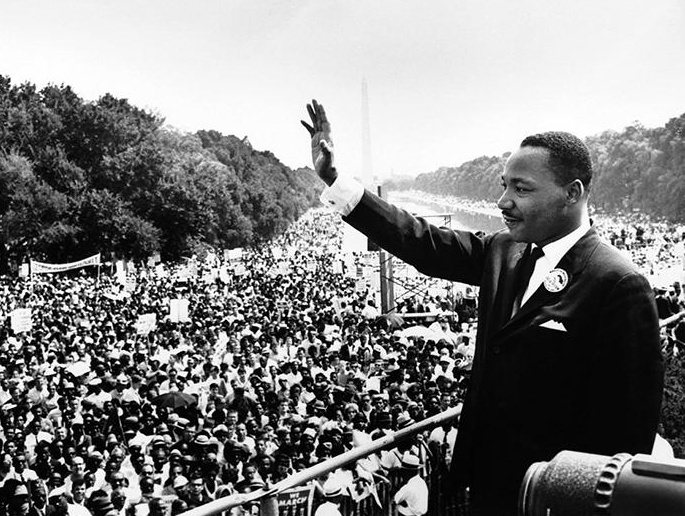Movement in the City, Melrose Park, Suffers Fire
A fire briefly burned in Movement in the City’s (new faith community) Melrose Park campus this morning. Firefighters, who rushed from a nearby station, quickly extinguished the…
NIC CORR Statement on the 50th Anniversary of the Assassination of Dr. King

The Rev. Martin Luther King Jr. addresses the crowd from the steps of the Lincoln Memorial where he delivered his famous “I Have a Dream†speech during the Aug. 28, 1963, march on Washington, D.C. Photo by the United States Marine Corps.
As the nation marked the 50th anniversary of the assassination of Dr. Martin Luther King, Jr., we take the opportunity to challenge the congregations of our Annual Conference to consider once again, what it would truly look like to live into Dr. King’s vision of Beloved Community. What’s more, what would it look like for us all to live into God’s vision of Beloved Community, the unified Body of Christ, that upholds God’s mandated ideals of loving God and loving neighbor as Christ has loved us? (Matthew 22:37; Mark 12:30-31; Luke 10:27; John 13:34; Ephesians 5:2)
We pose the question because it may be many of us have actually stopped asking ourselves. Many communities are segregated, some by default, some by design—created by White flight and a series of socio-economic policies put in place that limit access by all persons to equal opportunity to live in certain communities. Many of our churches are segregated. Perhaps at one time they represented the surrounding community. Today, however, they have become silos unto themselves. In these situations, it is easy to simply stop asking questions about what might be our own complicity in the perpetuation of cycles of racism, exclusion, and injustice that plague our society and flood the airwaves.
Racism and the evils that flow from it and its cousins- sexism, ageism, and any other ideology that diminishes the sacred worth of all of God’s children made in God’s image -- happens somewhere else or happened at some other time. To those people over there. Not to us. Not in our community. Not here. Not now.
We would suggest that if no one is talking about these issues in your church or community, then that right there might be a sign of a problem. If everyone thinks that these concerns are for others somewhere else because our community, our church is full of people who look and think “just like me or just like us,” then we have lost sight of what it means to be the Body of Christ. If any part of the body is hurt or afflicted, the whole body is aware and hurts. Think about how much misery can be caused by a splinter, a toothache, a blow to a thumb by a hammer when pounding a nail. The whole body is aware and suffers! We take steps necessary to heal that which is wounded. The same should happen as the Body of Christ is impacted directly by or witnesses societal injustice. We should care and take action to heal that which is wounded.
Just as some conditions go untreated, however, because we are unaware we have them, the sin of racism, apathy, and indifference can eat away at the soul of the church because we are unaware we have a problem. Again, we may not perceive the problem until someone asks the questions how are we loving God and loving our neighbor—all God’s children—as Christ loved us? How are we making that love known both inside and outside of the church?
We point you once again to the plethora of resources offered by the General Commission on Religion and Race for use by congregations in beginning this kind of self-analysis and dialogue internally and with the larger community on ways to address the scourge of racism that continues to exist in our land (www.gcorr.org).
It does not matter if you live or worship in a context that is not diverse. No community or congregation is an island, particularly ones claiming to be the home of disciples of Jesus. That makes them a part of the larger Body of Christ and subject to the concerns Jesus had while he journeyed with humanity here on earth. The first step is to see where we all fit into the puzzle. After taking a closer look at the puzzle, however, we do not stay puzzled, but rather we move with the intention to become the Beloved Community that Dr. King envisioned and that Jesus suffered, died, and resurrected to redeem.
A fire briefly burned in Movement in the City’s (new faith community) Melrose Park campus this morning. Firefighters, who rushed from a nearby station, quickly extinguished the…
Christ United Methodist Church in Rockford suffered a fire on Monday night, Feb. 23, that started in its organ. Thanks to the fast response of the few in the building at the time, d…
For nearly a century, housing has been part of Humboldt Park United Methodist Church’s ministry. Now, through a partnership with LUCHA, the church’s 98-year-old building is being tran…
Reflecting on scripture and Building Beloved Community, Bishop Dan Schwerin contrasts God’s love-shaped authority with the fear-driven authoritarianism se…